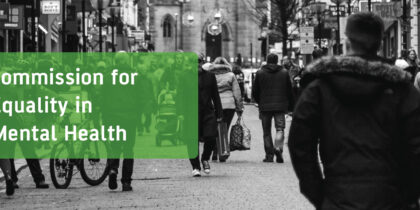Andy Bell
It’s widely acknowledged that NHS mental health services across the UK are working under growing pressure. While significant investment is going into the NHS to expand community mental health services in England in particular, the prevalence of mental health difficulties has been growing for some years and is likely to get worse in the aftermath of the pandemic and the ongoing cost of living crisis.
The NHS Benchmarking Network collects data from the major providers of NHS mental health services for adults every year. Its data provides invaluable insights into the shape of those services and how they are responding to our changing needs and circumstances. This year’s data, shared on the Network’s twitter account @NHSBenchmarking provides a snapshot of services in the financial year 2021/22.
The survey finds that community mental health services in England for adults support just over 700,000 people on their ‘caseloads’ each year, with a further 1.24 million people seeing an Improving Access to Psychological Therapies (IAPT) service. And there are 18,247 hospital beds providing a range of inpatient services. In addition, a growing number of people are getting mental health support in primary care (usually at their GP surgery) or from voluntary sector services locally.
The survey exposes some very worrying inequities in mental health care provision. Black people represent 3% of the adult population in the UK but 5% of community mental health service users, 8% of people admitted to a mental health hospital and 12% of those who are detained in hospital (rising to 19% of those in a ‘medium’ secure bed). This is not new or surprising. But it is a sobering reminder of the structural inequality in experience that Black communities face from mental health services in 2022.
The survey found that the median waiting time to be seen by a ‘generic’ community mental health team last year was 13 weeks, with longer waits for some types of team (including older adult and forensic services) and much shorter waits for crisis teams, assertive outreach and early intervention. The type of contact people have with a community service changed markedly during 2020. Last year, just over half of contacts (51%) were face-to-face, 42% were by phone and 7% used digital technology.
The survey also looked at inpatient mental health services for adults. It found that the number of beds continues to fall, with a gradual decrease since 2018/19. Admissions to beds have reduced by about 20% since 2014, but the average length of stay has gone up (from 32 days to 35) and rates of bed occupancy continue to be high – at 93% for adult acute services but lower for most other types. Worryingly, almost one in ten inpatients (9%) are in hospital for over three months. And almost half of people admitted to hospital (47%) are now sectioned under the Mental Health Act on arrival, up from just a quarter (25%) in 2012. Of further concern, one in 12 (8%) staff members in acute adult hospitals were absent due to sickness at any one time last year and staff vacancy rates were running at 18%.
The Benchmarking Network’s survey gives us a snapshot of NHS adult mental health services at a point in time. The overall picture, however, is complex, and different in all four nations of the UK. In England, the NHS Long Term Plan is beginning to change the way community services work, and significant extra investment is promised in the next year or two so that they can expand. At the same time, more people are going to need support for their mental health, and long-running concerns about staff numbers and the deeply inequitable provision of care remain. So it’s now more important than ever for government investment in mental health services to be sustained. It’s vital for every integrated care system to plan to close the gaps in the services it offers. And it’s crucial for equality to be given as much attention as expansion in the ongoing effort to improve both the quantity and quality of mental health care available across the UK.







